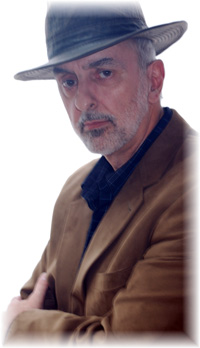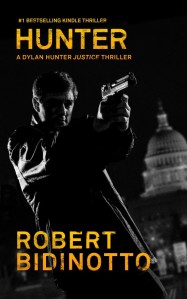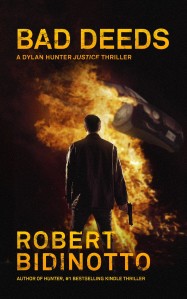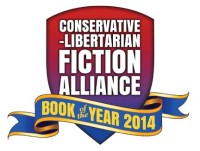I feel a special sense of kinship with any author of crime fiction who explores the “vigilante” subgenre. Especially if the writer happens to be an “indie” or self-published author, like me.
Claude Bouchard is one of “us.” He was born in Montreal, Canada, where he still resides with his spouse, Joanne, as well as the rulers of the household, Krystalle and Midnight, their cats. He completed his studies in human resources, accounting, and management at McGill University and worked in various management capacities in the fields of HR and finance for a handful of firms “for too many years,” he reports.
Claude’s first stab at writing was in 1995 with his debut novel, Vigilante. He followed on with The Consultant (1996), Mind Games (1997), The Homeless Killer (2009), and 6 Hours 42 Minutes (2011)–all part of the Barry/McCall Series born from Vigilante. He recently completed ASYLUM (2011), which is not in the series, and he is currently working on Discreet Activities, the sixth Barry/McCall crime thriller.
When Claude isn’t writing or editing his work, he spends his time making noise with his guitars, painting in oil and watercolor, reading, traveling (budget permitting), and planning to work out. I’m delighted that he has agreed to be interviewed for “The Vigilante Author.”
~*~
The Vigilante Author: Congratulations on your books, Claude. I and readers of this blog are particularly intrigued by your first novel, Vigilante. Why don’t you tell us about it?
Claude Bouchard: Thanks, Robert, and let me start by telling you how much I appreciate your inviting me to do this. I’m touched, considering the greats you’ve interviewed in the past.
Though I’ve always been an avid reader, I had never really considered doing any creative writing before Vigilante. What initially spurred me at the time was the O.J. Simpson fiasco, which got me thinking about violent offenders who escape justice. With this notion in mind, a story started taking shape and, before I knew it, I was sitting at the computer every evening typing like a mad man. Two months later, the first draft of Vigilante was complete.
In a nutshell, it’s the tale of a 10-year-old boy who witnesses his sister’s rape by their abusive step-father and vows to get even when he’s older. Some years later, he keeps his promise and starts eliminating violent offenders who have literally gotten away with murder. While the police, headed by Lt. Dave McCall, are attempting to track this serial killer, the media are rooting for the “hero” who is cleaning up the streets.
When the Vigilante starts sending emails to the police and media, taking credit for the murders, Chris Barry, a brilliant computer exec, becomes involved at the request of the police to try and trace the source of the emails. The action and suspense just keep growing from there until the shocking ending in the last line of the book.
The Vigilante Author: It’s next up on my reading list, Claude. You’ve had the opportunity to read HUNTER, which of course is also a vigilante tale. Clearly, there is something in this type of story that appeals to both of us, especially since they are our first novels. What was so compelling about the vigilante concept for you?
Claude Bouchard: My father has always been a fair and honest man, but also one who never accepted being bullied or getting his feet stepped on. This way of thinking was successfully transmitted in our upbringing and, as a result, neither I nor my three siblings ever let ourselves be intimidated by those who lean towards aggression to get their way. I’m not a big guy and was never known to be a brawler, but on the few occasions someone tried to physically push me around, I stepped forward, not back.
For example, a jock in high school started pushing me around one day, just to rile me, and I warned him to lay off or I’d punch him in the face. He continued; I punched him in the face and he laid off. On another occasion, while waiting for the bus one evening years ago, a bigger dude was strolling down the street, and just as he walked past, he turned on me and demanded my wallet. It had been raining earlier, so I had a closed umbrella in my hand with which I immediately whacked him on the side of the head. Surprised, he stepped back and started to protest and I hit him again, several times. Seconds later he was high-tailing away from me. I could relate others but you get the picture.
What I’m trying to say is, I was brought up to fight when something or someone is wrong. That’s where the vigilante concept is fueled from for me. People who prey on others deserve to get taught a lesson. Doing it on paper allows me to make those lessons more “meaningful.”
The Vigilante Author: I can relate to that. Without giving away any plot spoilers, in what ways are our two treatments of the vigilante theme similar or different?
Claude Bouchard: Our vigilante themes are similar in that both our protagonists have become avengers as a result of having been personally affected in the past by the wrongdoings of others. Though each their own person, our vigilantes resemble each other in their ingrained sense of justice which, however wrong legally, is morally right. They are not mugging innocent people, raping women, and terrorizing neighborhoods. Quite the contrary: They are “removing” the muggers, rapists, and other violent offenders which the justice, penal, and correctional systems failed to adequately deal with. I happen to be rather proud and fully support both our vigilantes.
The Vigilante Author: All reasons why I can’t wait to read Vigilante, Claude.
You mention the two ongoing characters in your series, computer expert Chris Barry and police Lt. Dave McCall. I find that for many authors, their main focal characters represent symbolic projections of things that are personally important to them. Is that true of these two characters for you? And if so, would you mind sharing what they symbolize to you? Do they represent variations on some common theme, or do they represent completely different themes?
 Claude Bouchard: Indeed, both Chris and Dave are strong proponents of justice and they reflect my beliefs. This is clear with Dave simply on the basis of his position as a hard-working, devoted cop.
Claude Bouchard: Indeed, both Chris and Dave are strong proponents of justice and they reflect my beliefs. This is clear with Dave simply on the basis of his position as a hard-working, devoted cop.
In regards to Chris, a little elaboration, if I may. My background is in human resources, a field in which I held various management positions with a handful of firms over the years. During that time, I was involved in three separate criminal investigations, one of which had to do with a truck heist of $600,000 of merchandise and the subsequent reselling operation of the goods. Long story short: The case was cracked, arrests were made, and working with the detectives on this was a massive adrenalin rush.
When I wrote Vigilante, there was no doubt that Chris Barry would be a white-collar professional; but I felt going on the IT side of business opened the door to more possibilities in his assisting the cops nab the killer than if he’d been a HR executive.
The Vigilante Author: Is there any overarching theme, concept, or moral that connects all the tales in your series, or that motivates the two heroes?
Claude Bouchard: Simply put, the common theme throughout the series is: “If you’re doing something illegal, you just may end up getting hurt.” My heroes are motivated by their sense of justice and determined to make the aforementioned theme a reality.
The Vigilante Author: Claude, I wonder how you would characterize the genre of your fiction?
Claude Bouchard: I’ve always considered my novels to be crime thrillers. Following Vigilante, I wrote four other novels with Chris Barry and Captain Dave McCall as central characters, and I’m currently working on Discreet Activities, the sixth in the series. I’ve also written ASYLUM, which I’ve called more of a psych-thriller, though there are definite crime and suspense issues involved. I particularly enjoy ending a story with a twist whenever possible.
The Vigilante Author: Care to share a bit about your background?
Claude Bouchard: I was born and raised in Montreal, though we did live in San Francisco for eighteen months when I was 3-4 years old. My brother, two sisters, and I were brought up by our loving parents who taught us proper morals, respect, and work ethics. We were a tight-knit family then and we’re even tighter now.
Reading was a popular activity in our household, a regular form of entertainment, from magazines such as Readers Digest and National Geographic to novels of various genres. I fondly remember graduating from The Bobbsey Twins to The Hardy Boys and Tom Swift, followed by my brother’s complete series of Alistair MacLean novels. Mystery, crime, and espionage novels always attracted me, which is why I write crime thrillers today. Though I don’t remember his stories in detail, as it has been a while, I do remember enjoying MacLean’s novels, where the protagonist was generally a lone, quasi-indestructible man who managed to succeed against all odds.
The Vigilante Author: I loved Alistair MacLean for the same reason. In fact, he seems to have been the inspiration for a lot of contemporary thriller authors, including Lee Child. Any other decisive influences on your thriller writing?
Claude Bouchard: Over the years, writers such as Ludlum, Connelly, Clancy, Crais, and others have taught me, however indirectly, about format, structure, and flow, character and plot development, and so on. What I mean to say is the more we read, the more we learn for our subsequent writing, even including additional vocabulary.
As far as comparing my writing to others, at least in terms of genre, the authors I mentioned, as well as Lee Child and Jeffery Deaver, would be in the ballpark. I’ve had one person tell me he enjoyed my writing as much as that of his favorite author, Stephen Leather, which was rather flattering.
The Vigilante Author: Tell us a bit about your writing methods. Outliner, or “seat of the pants”?
Claude Bouchard: Definitely seat of my pants. I’ll start with a vague idea and begin writing. Strangely enough, I’ve always had my title from the get-go and that’s what I typed first. I might loosely plan upcoming sequences and jot a few notes, but the story usually takes me where it’s going.
The Vigilante Author: If I spied on you through your office door keyhole, what would I see?
Claude Bouchard: Anyone spying on me during a typical day would see me jumping from my WIP [work in progress] in [Microsoft] Word to one of several tabs open on the Internet, sending a promo tweet on Twitter or responding to some tweets received, checking website visitor stats, books sales numbers, researching, etc. At some point, one would no doubt observe Midnight, one of our cats, come join me and scream for attention.
The Vigilante Author: I should introduce Midnight to Luna, the cat I share with Dylan Hunter. She poses similar distractions for me. Besides your cat, what’s the biggest challenge for you in writing? What comes easiest to you, and what do you love about it?
Claude Bouchard: I’ve always striven to make my stories believable. My characters don’t take a bullet to the chest to then yank it out with their fingers and toss it back at the shooter. I want my novels to reflect things which could actually happen. That said, if I have an idea about something I’d want to make happen, it has to be doable and this at times requires a lot of research before finding the confirmation that it can, in fact, be done.
The easy part for me is the actual writing in terms of sentence structure, punctuation, and the like. The ultimate rewards and pride generators are sentences such as, “I LOVED your book!”
The Vigilante Author: What drives you to sit in your chair before the keyboard every day? Is it that external response, or is it something inside of you?
Claude Bouchard: My main motivation is simply the pleasure writing brings me. There is something unexplainable about when I start writing, get “in the zone,” and words, sentences, and paragraphs rush out. It may seem strange to some, but other writers will surely understand the excitement I’m referring to, which is akin to an adrenalin rush.
I write with the intention of providing believable, quality entertainment to my readers. Since research, writing, and subsequent promotion are all time-consuming tasks, another objective I hope to attain is a level of sales sufficient to allow me to keep on writing without any serious concern about paying the bills.
The Vigilante Author: Like me, you are a self-published author. Did you try traditional publishing first?
 Claude Bouchard: When I wrote my first three novels in the mid-to-late ’90s, the publishing world was a different place. Submissions to agents or publishers were done via snail mail, and cost-effective self-publishing did not exist. Responses to queries were usually negative, when they were even received to begin with. Having put so much effort in getting my stories out and then having to beg for recognition was quite frustrating. It left a bad taste in my mouth and led me to back away from writing for several years.
Claude Bouchard: When I wrote my first three novels in the mid-to-late ’90s, the publishing world was a different place. Submissions to agents or publishers were done via snail mail, and cost-effective self-publishing did not exist. Responses to queries were usually negative, when they were even received to begin with. Having put so much effort in getting my stories out and then having to beg for recognition was quite frustrating. It left a bad taste in my mouth and led me to back away from writing for several years.
The Vigilante Author: So, when and why did you make the switch to indie publishing?
Claude Bouchard: When I decided to self-publish in 2009, the first intent was simply to see my novels as actual printed books. Then a few people I didn’t know bought them and told me they enjoyed them. That got the bug going, and I started looking into possible marketing avenues.
I did end up finding an agent through my social media networking and was represented for eighteen months until she pulled out for personal reasons. While other of her clients hoping for a traditional deal were left hanging, I had the satisfaction of knowing my novels were already out there working for me.
The Vigilante Author: So how is it working? What have been the challenges and rewards for you?
Claude Bouchard: Self-pub opportunities are readily available today with ebooks and POD [print on demand] books, but the selling and marketing tasks are quite demanding. Until one can develop a solid readership which morphs into word-of-mouth advertising, selling the books is practically a cold-calling activity with one-on-one sales. The only thing to be done with such an obstacle is to persist. Thanks to social media, support, encouragement, and help can be found through other writers battling similar obstacles.
While the indie route is a lot of hard work, it’s also quite exhilarating to have complete control, whether it’s book cover choices, pricing decisions, or anywhere in between. I definitely do recommend self-publishing to others, as long as they’re willing to put in the required effort.
The Vigilante Author: So do I. Which compels me to ask: What qualities do you think a would-be author needs most?
Claude Bouchard: If one wants to be a writer, one must have thick skin. You have to be able to handle rejection and criticism. Not everyone will like you or your work, and if you can’t deal with that, you’re not going to make it. I’ve known people who burned out because their first and only novel turned out not to be the bestseller they believed it was.
An obvious required quality, but one which many people don’t seem to recognize, is you have to be able to write or get the services of a good editor. I’ve read too many books by indie authors in recent years, some of which actually had great storylines, which were ruined by lousy grammar, spelling, and punctuation mistakes and improper formatting.
The Vigilante Author: As you know, Claude, those are pet peeves of mine, too. Tell everyone where they can buy your books and how can they contact you.
Claude Bouchard: My books are available in print and ebook format at a variety of online retailers, all the links for which can be found on the “My Books” page on my website. Any readers who wish to contact me can do so via the “Contact Me” page on my site. I can also be reached on Twitter (@ceebee308) and on Facebook. They should visit my Amazon.com Author’s page, too.
The Vigilante Author: Great. Any final words to our readers?
Claude Bouchard: Robert, I want to thank you once again for granting me this opportunity as I truly enjoyed participating in this interview. I wish you continued success with Hunter and look forward to the sequel so, keep on writing!
The Vigilante Author: Thanks, Claude. You too!
~*~


 Photo (c) by Debbie Scott
Photo (c) by Debbie Scott




